Saturday, 01 June 2024
Traditional corner stores in general have been almost extinguished from the streets of Munich, surviving mainly in the form of immigrant grocery stores which unfortunately rarely stock organic items. However, there are a few survivers from the time when organic was an unknown word in supermarket chains: small supermarkets equipped with wooden shelves and as crammed to the brim as possible for orderly German souls. Usually they have everything you need for your daily life, just give you fewer choice between brands and varieties. Sometimes you'll find delicatessen the big players don't stock, and fresh produce is as fresh as from their competitors. Prices may be a few cents higher than the cheapest option in one of the retail chains, but you will be surprised to learn that many products actually are less expensive in a corner shop. In addition you may have a chat with the shop assistants, sometimes the owners themselves, and usually will be given a competent answer to questions you may have. Many of these shops have some tables and chairs where you can have a coffee, snack or vegetarian lunch.
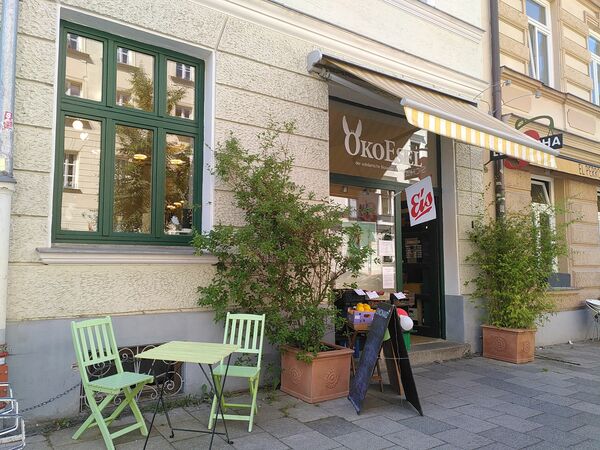
Groceries
The (to my knowledge) oldest full retail organic neighbourhood shop in town, theLebascha in Haidhausen, was run collectively by a bunch of friendly women until they retired. The shop would have been lost for the neighbourhood if not the distributor had been tieing up strings with the community supported co-operative Ökoesel ("eco donkey" is derived from a pet name for bicycles – "Drahtesel" – as they started up as a bicycle delivery service) in Neuhausen. Since 9th of July, 2022 the base line of the shop has been financed by membership fees (depending on self-assessment), but Lebascha continues to be open for everyone: None-members simply pay (a usually low) market-price, members are entitled to discounts (usually between 12 and 20 percent). With its (conventional) liquorice shop-in-shop (to my knowledge offering the largest selection liquorice in town) the Lebascha also is a hot tip for aficionados. An assortment of loose-weight herbs and spices, and a basic range of loose-weight cereals, nuts, legumes and grains, detergents and soap make the Lebascha the only surviving zero-waste shop near Ostbahnhof. Note that it is closed on Wednesdays and does not accept cards, but members may chalk up and pay later.
A few corners away from tube stop Implerstraße in Sendling the neighbourhood grocery Hollerbusch ("elderbush") offers
vegan and vegetarian lunch as well as yoga, pilates or singing lessons in a backroom.
The shop is also a delivery hub for the Munich based community supported agriculture project Kartoffelkombinat and offers gravity bins to refill dry food and reduce package waste.
Immigrant shops and traditional corner stores
While these small supermarkets cater for all daily necessities including fresh fruits and veges there's no such thing as an all-organic immigrant grocery focussing on the latter and supplementing with a selection of dry goods and delicatessen from their owner's place of birth. The nearest you come is Giesinger Fruchtmarkt near tube-stop Kolumbusplatz. As about three quarters of the fruits and veges as well as most of the Italian delicatessen are conventional you have to carefully watch out for the bio keyword. Apart from organic greens they also offer organic choices for olive oil, wine, pasta and cheese.
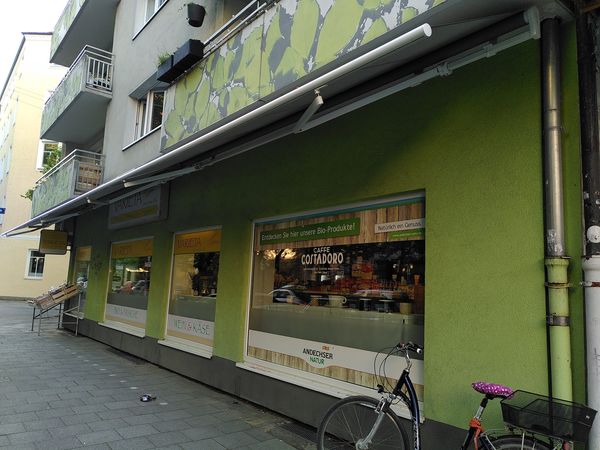
A similar owner-run mini market, Varieta am Körner Eck, is located in the Glockenbach neighbourhood, on Auenstraße between the Reichenbach and the Cornelius bridges. The bakery items are all organic, and organic products in the self-service area are clearly marked "bio" on the shelf. The shop offers a lot of directly imported Italian dry food, but unfortunately none of it in organic quality. Also most of the fresh fruits and veges are conventionally produced.
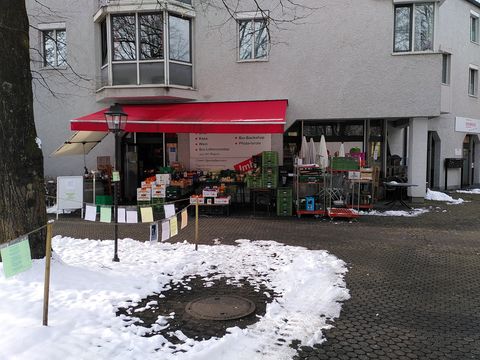
Remember the tales of parents or grandparents about the corner shop they went to as children to buy a single sweet which the shop keeper would put down on a list for their parents to pay later on when they came to shop bread, milk, veges and all the ingredients for the home-cooked meal? The spirit of these shops from the past you may find left in some immigrant shops and this is the reason why I list the Viktualieneck in Bogenhausen in this section. I learned about this crammed greengrocer's shop opposing the newly build neighbourhood of Prinz-Eugen-Park on my quest for shops supporting package-free shopping, but when I went there it turned out a likeable traditional supermarket offering
fresh fruits and veges, regional delicatessen, bread and rolls, wine and all kinds of food. About half of it is organic, namely all the bakery products and certainly more than half of the pre-packaged food. Most of the fresh fruits and veges come from a conventional local market garden
– the turnaround for organic greens wasn't good enough among his customers, and his emphasis was on avoiding waste the shop keeper told me. Package-free shopping is possible for all fruits and veges as well as all items from the bakery, meat and cheese counter.
I cannot tell you whether the shop chalks up for trustworthy customers, but if you are in the vicinity support this shop instead of the supermarket chains nearby.
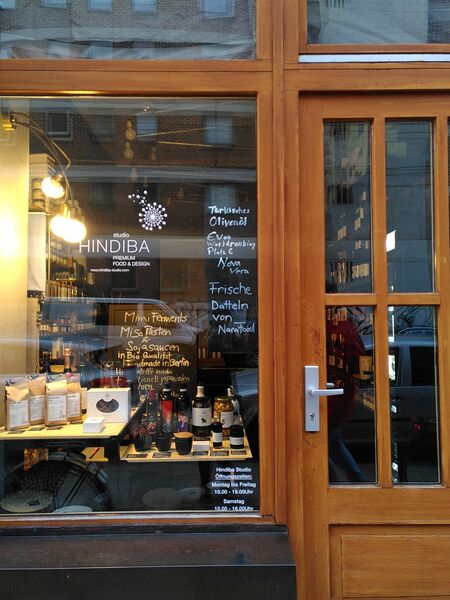
Delicatessen
The upmarket contrast to these somewhat shabby grocery stores is naturally to be found in the posh neighbourhood of the Lehel:
Studio Hindiba offers oils, herbs and condiments, olives, all types of rice, the famed ferments of Berlin's Markus Shimizu, a carefully selected range of wines and other predominantly organic delicatessen. For the smaller purse it may be just a beautyful shop to marvel at, but if your budget isn't painfully tight it's the perfect place to shop a foodie gift for someone special.
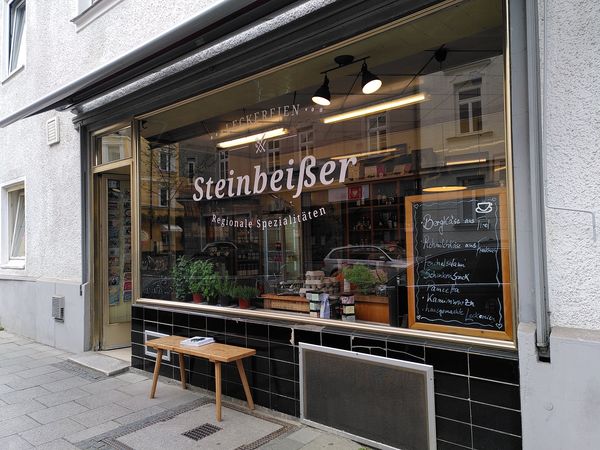
A few steps from Wiener Platz you'll find Steinbeißer, a cosy owner-driven deli advertising 'regional specialities'. Take this with a grain of salt – the organic Italian olive oil and Scandinavian candies (not organic) are small-scale produce specific to their region of origin, but certainly not from the greater Munich area. Most meat products come from small-scale Austrian farms which are likely to produce according to near-organic principles. Certified organic products unfortunately do not dominate the pleasantly arranged tables and shelves with artisanal products – predominantly foodstuffs and wine, but you may ask the owner about the provenance of his fare.
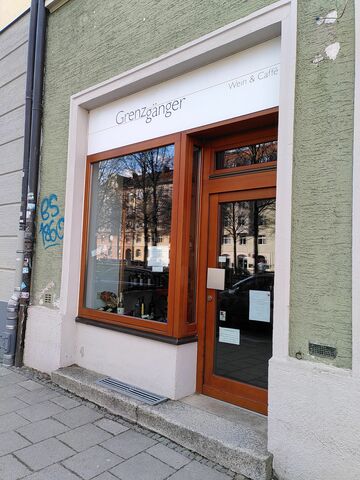
Wine, pepper and coffee from carefully selected small-scale producers, that's the focus of Grenzgänger ("border crosser"), a lovely shop directly located at the beautiful Bordeaux-Platz in Haidhausen, just opposite Café Reichshof. When you come here during the cold season you may find yourself welcomed by the warmth of a fireplace, and you can get a speciality coffee (14 types of Arabica to choose from) into your own mug. During covid-19 restrictions cream-ware cups aren't provided, so if you come without a mug you will be charged an extra 20 cent for a plastics-free one-way cup.
Unfortunately most of the products aren't certified organic, with the notable exception of the Demeter-certified honey and bee wax candles of a local beekeeper who is working in accordance with biodynamic principles, i.e. the gold standard for animal welfare.
Specializing in cheese and supplements – wine, olives, oil, herbs, condiments, to name a few – the Luigino's booth in the Southern part of Viktualienmarkt, opposite the crossing of Reichenbachstraße and Blumenstraße is the perfect place to shop for a picnic or the no-frills romantic candle light dinner. Once an almost entirely organic cheese booth the percentage of organic products on sale has diminished during the past years: mainly due to the advent of artisanal, yet conventional Italian cured meats, partially due to a lesser focus on organic labels on the selection of cheeses.
When ordering an Italian-style sandwich to take away you may wish to enquire about the ingredients and probably stick to the vegetarian ones since the Italian cured meat products usually are not organic.
The owner once run a delicatessen in Maxvorstand which was replaced by an organic ice-cream parlour in 2018.
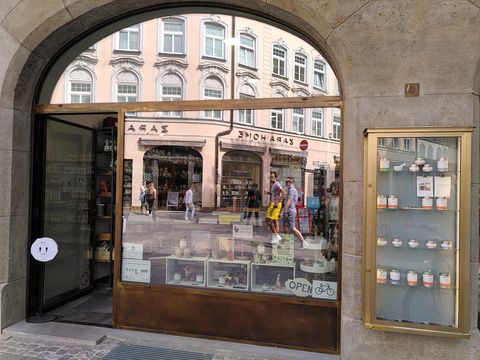
Herbs and spices
Not exactly a spice bazaar, but a pleasant spice and herbs shop Gewürze der Welt ("spices of the world") had a long tradition on its former location in Thiereckstraße in the very city centre, but when the historic Ruffini house re-opened after a two-year period of restoration work in 2020, the shop moved back to its roots in the Sendlinger Straße (now) pedestrian area. As the name suggests you will find a world of spices, herbs, blends and condiments, a notable part of them in organic quality.
Munich's first organically certified herbalist is tucked away in a non-descript side road near Sendlinger-Tor-Platz, just a few steps aside the remnants of the Glockenbach neighbourhood's famous queer bars. Light and friendly the
Kräutergarten offers all kinds of organic dried herbs, spices, natural cosmetics and the like.
Sonnentor, the leading Austrian producer of organic herbs and spices, has a shop in Munich, too: Located in the basement of
Stachus-Passagen, a generally boring shopping mall a level above this central urban train and tube station, it's probably not the shop that you'll find by accident while taking a stroll through the city. Apart from herbs, spices and condiments they also have a selection of natural body care – an easy place to shop for a nice last-minute give-away.
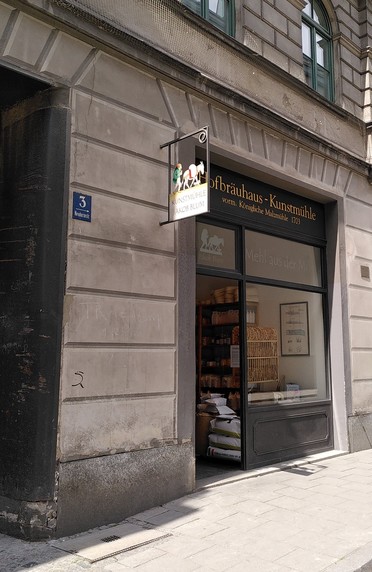
Special shops
The only operating corn mill in Munich with its cosy mill shop is located in a small street a few steps from the tourist hotspots of Marienplatz and Hofbräuhaus. The Hofbräuhaus-Kunstmühle offers all types of flour, bruised grains, semolina, bran and cereals, predominantly of corn grown in the region. An increasing number of these artisanal products are organic, so watch out for the 'bio' keyword on the classic paper bags or the listings of the web shop. These products are also the base ingredients for the artisanal home bakery E. Knapp & R. Wenig next door where you can buy hand-made bread and rolls based on traditional, predominantly Munich recipes. The mill shop also stocks a selection of organic dried fruit, olive oil, raising agents and other baking ingredients as well as dry breads like South-Tyrolean Schüttelbrot.
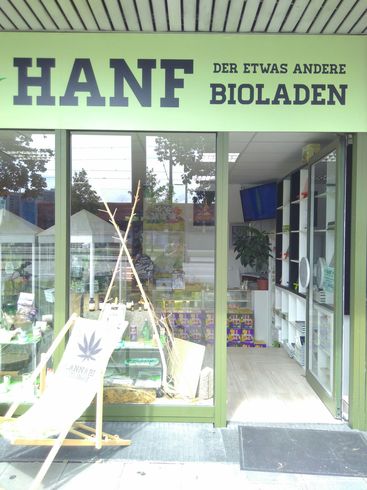
Another very special mono-themed shop, Hanf – der etwas andere Bioladen, sells everything containing THC-free hemp: beer, lemonades, cookies, bars, tea, ice-cream, chocolates, body care, clothes, liquids, pet food and more. Although the name suggests it not all products are certified organic, especially not in the non-food range, but the sheer number of goods based on this versatile plant is quite impressive. The main shop (which is closed on Mondays) isn't located in the most inviting part of town but can easily be reached from Leuchtenbergring urban train stop. But wait: in 2019 a second one opened at a tourist-friendly location between Isartor and Marienplatz.
Ceased to exist
The following places shut down and were replaced by other, not organic ones. So don't be confused when you find references to them on the web:
2024-06-01 10:45:00
[Munich, Haidhausen, Schwabing, Lehel, Maxvorstadt, organic, lunch, snacks, coffee, supermarkets, deli, grocery, Italian, vegan, hemp, flour, mills, fashion, bodycare, spices, herbs, delicatessen, eatery, zero_waste, unverpackt]
Link

Sunday, 24 March 2024
Organic supermarkets may introduce a larger audience to sustainable organic produce and thus spare the environment, but do not necessarily help to reduce the amount of one-way packaging, save plastics. As a conscious consumer you will without doubt prefer non-prepackaged fruit and veges, available from all organic groceries, supermarkets and market boothes, and hand your bag over the bakery counter, making it verbally clear that you do not need a paper bag, to avoid paper waste when buying bread and rolls.
You're also safe if you restrict your shopping of dairy products, juices and soft drinks to returnable glass bottles. Some organic shops (such as Vollcorner) offer a small selection of wine in deposit bottles. Since 2021 we also have seen the gradual arrival of dry food, preserves and spreads in returnable glasses formerly only used for yogurts.
Starting in 2017 the more dedicated organic supermarket chains have been introducing measures to reduce packaging and allow customers to bring their own containers to fill with selected goods.
Unless stated otherwise all shops mentioned in this post will help you out with clean and empty reusable glass jars or organic cotton bags which you – depending on the shop – can either buy or lend if you forgot to bring your own.
Package-free food and household necessities
Early in 2016 the city's first crowd-funded vegetarian zero-waste supermarket Ohne ("without") opened its doors, followed by a
second branch early in 2019. End of June 2023
this became history: The insolvency, following the closing of other independent
owner-run package-free supermarkets earlier that year, left the Eastern,
Northern and central neighbourhoods without a place to effortlessly replenish
store cupboards without producing package waste.
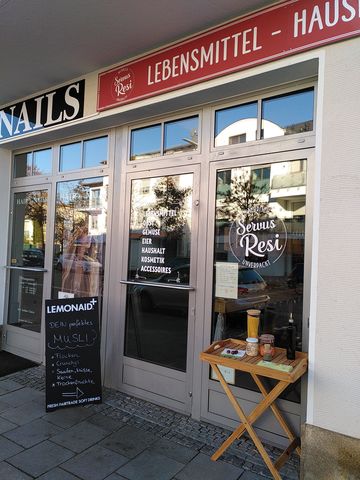
Gone the days of the pandemic spring and summer of 2020 when zero-waste groceries were blooming in town: Approximately at the same time as the Westend got its (now closed) neighbourhood shop, Servus Resi opened in Obersendling right before the lockdown in March 2020, in a non-descript middle of no-where near the Siemenswerke former industrial area. Don't let you fool by the uninviting environment at a noisy car road – what you'll find here is a busy neighbourhood gem nicely furnished in light wood, with a superb selection of dried herbs and spices aside the usual dry food, and a nicely arranged selection of household items. The greengrocery section is rather limited – local organic apples and potatoes in late autumn 2020 –, and there are no dairy or other food requiring cooling, but the shop offers both, liquid body care products and household chemicals from refill stations. Everything is supervised by the friendly shop-owner, Chrissy (not Resi) herself, and if you wish to get in touch with people from the neighbourhood take the burden to come here even from other parts of town.
In Laim Nebenan unverpackt ("package-free next door") followed in summer 2020. The latter is organised as a co-operative (though the location next to a co-operative bank is purely accidental) and sports a
small neighbourhood coffee place. They offer a very good selection of dry food, fresh fruit and veges, but less dried herbs and spices and no spirits. You can however buy wine and their selction of condiments and preserves in one-way glasses have the effect that you can do all the regular daily shopping here in one place if you don't come with more advanced expectations.
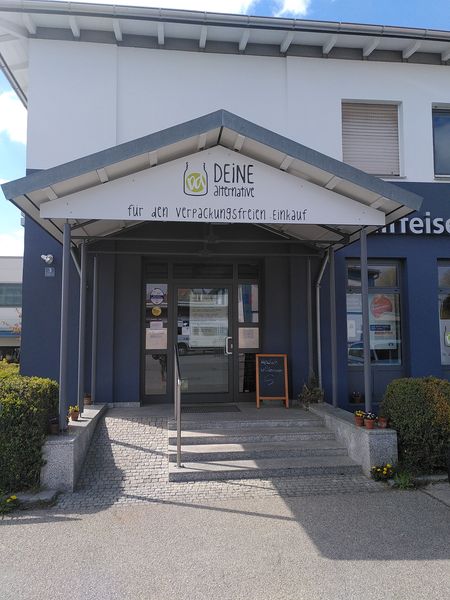
Half a year earlier, in January, 2020 another
co-operative, Deine Alternative ("your alternative") in Zorneding, opened on the premises of the former Raiffeisen co-operative bank, just a few steps from the urban train station.
When you get inside you will however immediately forget about its past as a bank, the shop is carefully and pleasantly decorated, with wooden furniture and equipped with a proper Italian coffee machine for a break in between. Most of the often local produce sold here is organically certified or at minimum sustainably produced, though it would be nice if conventional loose-weight products were clearly marked. In addition to the gravity bins and containers with dry food there's a decent selection of dried herbs and spices, sweets, bread, some confectionery, a small selection of fresh organic greens and veges, cheese and milk from the Nirschlhof organic farm (but interestingly enough no whole-meal flour or oils, vinegars or spirits by the litre). In a separate room you can buy toiletries, household chemicals and items supporting a zero-waste lifestyle. Everyone is welcome, but members of the co-operative pay less.
North of Zorneding, in the municipality of Poing, the co-operative
Bunte Bohne ("coloured/colourful bean") with its zero-waste supermarket cum cafe is facing a hard time as of June, 2023. Visit and support the place while you still can.
The neighbourhood of Trudering (a more than 1200 years old former village and suburb in the Eastern part of Munich) does not have a dedicated zero waste supermarket, but twice a month, on Tuesday afternoons, an indoor farmer's market dubbed Tante Trude ("Auntie Trudie") keeps popping up in the neighborhood associations' offices. Organic farmers offer local produce, and you can donate to the Trudelade project: home-cooked jam made from abandoned fruit trees in the neighbourhood (you'll get a jar as reward).
South-South-West of Munich, the city of Wolfratshausen (the endpoint of the S7 urban train) likewise sports a package-free shop centrally located at the Obermarkt market place: Ohnverpackt, another zero-waste shop opening within the corona lockdown in the spring of 2020,
is even certified organic. The few conventional products of regional origin are clearly marked as an exception. It does not only offer the usual dry food and household chemicals, but also a good selection of cheese and antipasti. What you won't find are fresh fruits and veges, meat and sausages.
There's a small day cafe, unfortunately all closed on Mondays.
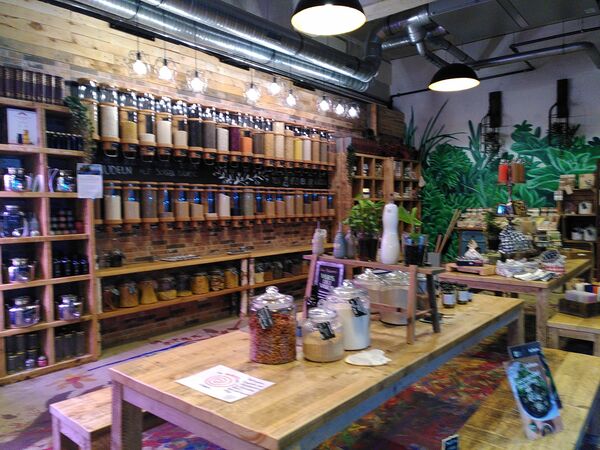
South of Munich, directly located at the S-Bahn station of Neubiberg the owner of the conventional Edeka supermarket opened a side project next door,
Hertscheck Unpacked which hopefully attracts people who usually wouldn't buy off the conventional supermarket tracks.
Although not marked most of the unpackaged dry food is organic – the shop assistant explained that since the shop itself isn't certified but fills the gravity bins and glass jars from bigger packages it isn't allowed to declare the products as "bio". There's also a good selection of loose-weight natural body care (both, in solid and liquid form) and household chemistry from brands I haven't found elsewhere. You can refill organic gin and regional (though not organic) whisky. The highlight of the shop are grow cabinets with special lamps where a good selection of herbs is grown, naturally free from agrochemicals. For city dwellers the place most certainly is worth
a bicycle ride (through the beautiful eco park Umweltgarten Neubiberg where an organic farmer's market is held on Thursday afternoons) or urban train tour even though the place has less liberal opening hours than the conventional supermarket next door.
Fun fact: The former premises of the Edeka supermarket now host a Vollcorner organic supermarket.
In smaller municipalities, (urban) train stations usually are the only public (and sustainable) transport hub and as such a natural place for zero-waste supermarkets. So I was glad to find a new (in 2022) co-operatively organised organic zero-waste supermarket in Unterföhrung, next to the S-Bahn train station. The shop dubbed
UFG (short for "unverpackt, fair, gemeinsam" – "unpacked, fair, together")
is open to everyone, with a 10 percent discount scheme for members.
It does not only offer dry food, condiments and household items, but also bread, rolls, cakes, dairy products and fresh, predominantly local fruits and veges. On Thursday afternoons you also may buy local organic meat and sausages, cheese and other fresh artisanal organic products from a mobile booth of the Tagwerk co-operative.
There's a small lunch cafe offering organic soups, quiches and sandwiches as well as cereal bowls, coffee, smoothies, tea and cake, all vegetarian, often vegan. Unfortunately you have to register with an app service to take your food with you in a returnable bowl or box, and nevertheless may have to come back to the shop to return it. So better bring your own boxes.
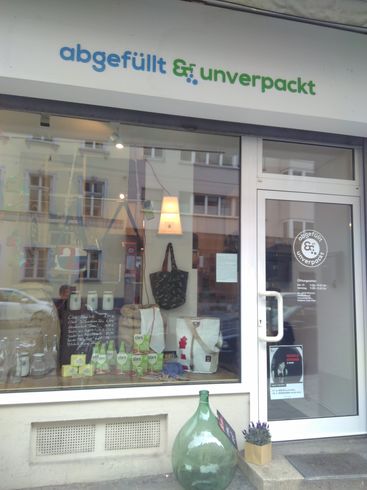
Plastic-free household
In March 2019 a tiny neighbourhood shop specializing in natural home cleaning opened in the Glockenbach neighbourhood: At Abgefüllt & unverpackt ("bottled and unpacked") the singer of the Munich-based band "Cat Sun Flower" warmly welcomes customers and passers-by and helps to (re)fill empty bottles with organic liquid household detergents. At the time of writing this shop was the only one in Munich selling washing powder by weight. In addition there are eco-friendly dishwasher tabs, body and hair soaps, fairly traded natural facecream in returnable glasses, towels, as well as upcycled and fairly traded bags and toiletry accessories.
About 20 years ago, Munich got its first – and to my knowledge only – organic department store centrally located a few steps from the Isartor: It consists of the city's first branch of the Basic supermarket chain with a self-service cafe on the ground floor and both, a self-service restaurant and a fashion and beauty store on the first floor. The latter,
Beauty & Nature, is a reliable source of organic clothes (with a focus on women and children), body care, home decoration, toys, dietary supplements and all types of sustainable household items including shoe shine, candles, seeds, cutting boards, or floor clothes.
Long anticipated, they started to offer refill for household detergents of the Sonett brand by the end of 2021, with a 10 percent discount. Since the staff is knowledgeable, friendly and helpful, do not hesitate to ask if you have any questions.
Supermarket chains
In autumn 2016 the local Vollcorner
supermarkets received an official permit by the Munich Department of Public Order (Kreisverwaltungsreferat) to fill customers' jars and boxes with
cheese, antipasti, processed meat products or cake. The Basic supermarket chain followed in summer 2017, while independent convenience stores often had done so anyway. What's missing are customers bringing appropriate containers or at least asking
the staff to fill their orders into returnable glass jars (Vollcorner, Lebascha and others) or stainless steel containers (Basic) provided by the shop itself. So be brave!
To avoid misunderstandings it is advisable to clearly point to your box (or ask for the deposit container) before placing your order at the sales counter and tell the staff to tape the receipt to it. Otherwise you may end up not sparing any waste: In the beginning the staff at the Basic butcher's disk would use the sheet of plastic-covered paper they'd usually wrap the purchase with to hand it over to you, along with the receipt taped onto the paper bag they otherwise would have used as outer packaging. In the mean time they got used to the procedure but were ordered to decline customer requests to buy meat this way. Since they started to provide stainless steel boxes for a deposit of 7 EUR there's however no excuse for one-way packaging here anymore. Artisanal organic butcher's shops will also fill meat into boxes you provide. The Herrmannsdorfer groceries (e.g. the one at Max-Weber-Platz) reward you with a few cents discount per saved packaging.
Until the end of 2022 Basic supermarkets had gravity bin dispensers for pasta, nuts, dried fruit, sweets, grains and more which all disappeared in the course of the company's
insolvency and take-over by the "teGut" chain. Package-free offerings at the remaining "Basic" branches are reduced to fruits and vegetables as well as food from the serviced bakery and butchers' counters.
The shops of the nation-wide operating Alnatura chain never offered refill dispensers. However, it has been increasing the range of products in returnable jars and bottles continously since 2021 – among others fairly traded nut butters, a number of dry products and even ketchup.
A small selection of dried fruits and nuts in refundable glasses as well as package-free toilet paper can be obtained from Vollcorner supermarkets. Their huge flagship store at Theresienwiese (with butcher's counter and lunch cafe) also experimented with a milk vending machine and a dedicated shelf offering all sorts of products in deposit glasses, but both efforts were discontinued due to low customer demand.
By the end of 2020 a number of conventional supermarket chains had introduced refill stations for dry food, too, but since you still have to do a lot of careful reading in front of the shelves to shop climate-friendly products, I won't mention them here, with one exception: the huge Tegut branch that opened in the Elisenhof shopping centre next to the main train station
in December 2020. This supermarket chain gives their customers a choice – all organic products are easily to recognise thanks to a light-green label on the shelves, and there's a great number of them in all product categories. Given the sheer number of products on sale the impressive refill rack at the left-hand side of the entrance aisle comprises only a negligible fraction of total sales, but it's a good start, and the best: All products in the gravity bins are organic. Come here for the biggest selection of package-free organic chocolate-covered sweets I've come across so far. There are grains, cereals, nuts, dried fruit, legumes and sweets, but no flour and surprisingly almost no pasta.
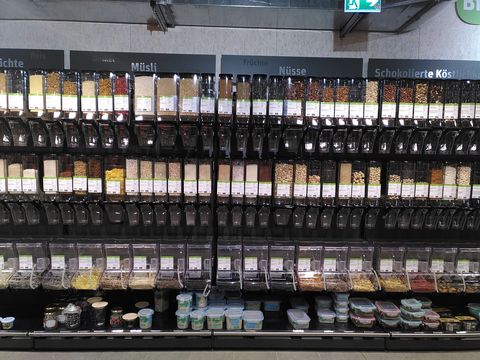
Although the supermarket has its entrance next to the Sunday-open (and if you ask me generally more pleasant) organic supermarket Biokultur in the Hauptbahnhof basement Tegut is closed on Sundays and public holidays as well as in the evening. When you have at minimum half an hour to change trains you will however reach to refill some of your dry food containers as long as you know how it works: Put your box onto the scales and choose "Tara-Bon". This will print a label. Fill the box and remember the product id on the lower end of the gravity bin. Put the filled box back on the scales and press the second "Bon" button beneath the "Tara-Bon" button. Now you will be asked to type in the product id. Scan the bar code on the previously printed label with the hand scanner, and there you go: A receipt with a price tag will be printed for you. Seal your box with this second label and hurry up to the cash counter.
Neighbourhood groceries
In Haidhausen the Lebascha neighbourhood grocery has been offering to fill all loose-weight products (cakes and bread, eggs, cheeses, olives, jelly gums and liquorice – note that the latter is not organic) in bottles, jars and boxes customers brought along. When the shop was taken over by the Ökoesel co-operative dispensers for grains, nuts and the like as well as household chemicals were added, and you can
buy all types of dried herbs and spices by the gram.
Ask for a deposit box in case you forgot to bring your own.
For home-made dried fruit stroll a few more steps down the street and see whether the Haidhauser Oase is open.
Household chemicals can be refilled at the Echt Bio Markt in Neuschwabing and at the Biochicco supermarket in the Au near Mariahilf-Platz. At the latter you can only refill original bottles of the Sonett label.
In Harlaching, the
independent Biowelt supermarket has a small zero-waste corner with dispensers for dry food, a good selection of loose-weight dried fruit and a dairy and butchers' counter where you can hand over your containers.
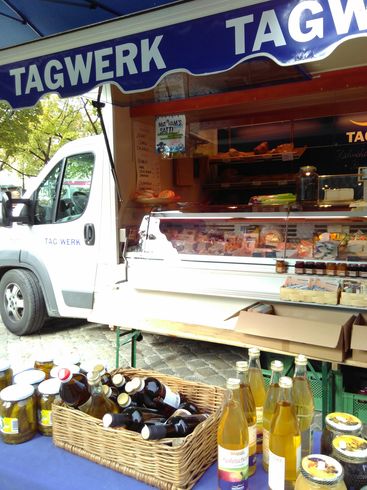
Farmers' markets
Once, sometimes twice a week farmers' markets are installed in many Munich neighbourhoods. Loose fruits and veges prevail here, and boothes selling organic produce (watch carefully for "bio" and "demeter" logos) will usually fill bread, cakes and pastries, antipasti, meat and dairy products into the containers you present. Notably at the boothes of the Tagwerk co-operative and the Hofbäckerei Steingraber you may be surprised to see that you're not the only one coming with her own boxes and jars.
On Saturday mornings you can find them next to the West-facing entry of Mariahilf church, in the neighbourhood of Au. Before the covid-19 pandemics all boothes (except the French fish monger) in the market block next to the church, right below the carillon, were organic,
but now it's no longer that easy. Therefore a comprehensive list: There are three organic market gardens (Biogärtnerei an der Isen alias Avanti Andi, Demeterhof Fahrenzhausen alias O'is bio and a third one also selling flowers and seedlings which you will immediately recognise when greeted with a friendly French accent). Put differently: Simply avoid the biggest greengrocery booth, "Helminger".
For meat, sausages, cheese and other dairy products there are the aforementioned two producers, and in addition the farm sale of Bergwinklhof Monigottsöd. The latter also offers a small selection of wine, but for good and knowledgeable advise on wines or non-alcoholic drinks to accompany a meal you'll better pay a visit to Uli Scheffler's organic wine trader's booth. While the juices are readly available in deposit bottles, returnable wine bottles are still very rare, and not used for high-quality wines.
If you feel adventurous on Thursday afternoons take the urban train S7 in direction Aying/Höhenkirchen-Siegertsbrunn/Kreuzstraße (or a bike ride) to the suburb of Neubiberg and pay a visit to the communal organic market on the pleasant premises of the Umweltgarten eco park, a true oasis within ugly suburbanity, with a small zoo, popular not only among kids. On Thursdays there's also an all-day market at Rotkreuzplatz. As on Mariahilfsplatz about half the boothes here are organic, though scattered all over the market area, with a cluster in direction Nymphenburger Straße.
Needless to say that the organic boothes on the famous Viktualienmarkt in the Munich city will happily support you when you make it clear that you want to use your own bags and containers. And the spring of 2021 did not only see the opening of an organic bakery in one of the solid market stalls in the northern part of the market, but also a tiny organic food shop for organic dry food grown and produced in the nearby Chiemgau region:
Satt und gut ("full and good") sells staple foods like grains, flour, eggs, honey and oil but also cookies, both pre-packaged and loose weight, partially from the smallest gravity bins I've seen so far. Note that this shop, unlike the market itself, is closed on Mondays
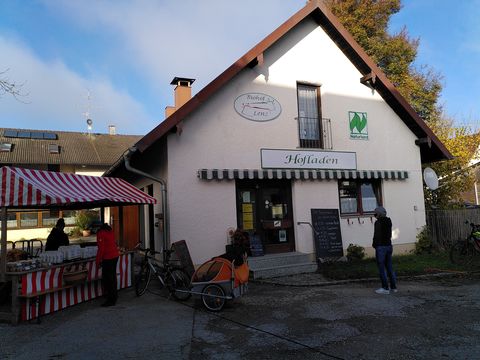
In Zorneding a small farmers' market is being held every Friday on the premises of the Biohof Lenz organic farm. Here you can buy local organic meat and meat products, cheese, bread, veges, and occasionally honey and bee products, wines and spirits. Although most stalls are organic there are a few exceptions offering conventionally produced specialities. The Lenz family's own farm shop keeps open at the same time and on Saturdays, but for buying their exceptionally good meat you should subscribe to their newsletter and order beforehand according to availability (you should be fast to answer). Unfortunately all the Lenz meat and sausages are vacuumized in plastic.
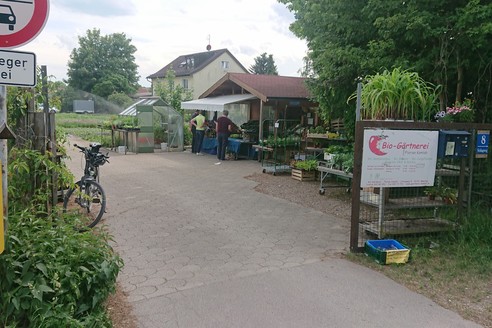
At the Western edge of town, in Pasing the organic market garden of Bio-Gärtnerei Kamlah has a farm shop open on Monday, Wednesday and Friday afternoons. You can not only buy salads and vegetables grown here but also organic seedlings for your balcony or garden patch. The farm has also a market stall at the Pasinger Viktualienmarkt which keeps open all days except Sunday offering a huge selections of organic fruit and veges, but no seedlings.
Tea shops
While coffee is readily available from
loose weight convenience stores, tea drinkers aren't well catered for: Usually you will find some tisanes and one or two types of black tea. Fortunately specialist tea shops still exist, and as they sell loose weight teas by the gram don't be shy and ask them to fill your tea box.
In the
Tee Gschwendner shop in the Asamhof backyard a few meters from the new pedestrian street of Sendlinger Straße this will work as long as the opening of your jar or box is wide enough for the shop assistant to fill it without touching it with her shovel. The franchise also sells conventional fare, so make sure to insist on organic quality – "Bio-Qualität" is the keyword. You'll find a decent selection of both, green, black and herbal teas, with and without aromatics. Bring a little time to stroll through the light and pleasant shop that has been at this place since the 1980ies, ask the assistant to show and suggest teas according to your taste and tell a little detail. When all your teas are filled into your jars you will be asked whether you fancy a tea sample, so it is smart to bring an additional small glass or jar.
Mind you that green tea doesn't store well in classic metal tea boxes as this material supports further oxidation processes.
In spring 2022 it turned out to be difficult to buy loose-weight organic flavoured tea as compliance to the EU regulation 2018/848 on organic products had not been established in time.
Coffee and food to take away
An increasing number of coffee places you may lend a Recup coffee cup for a deposit which you can return at any other shop participating in the retour scheme.
Some like the Neulinger bakeries will even give you a small discount for sparing the environment.
Most of the eateries reviewed here will fill your food into the boxes you provide for take-away as long as you make this clear before they start their usual routine which still means one-way packaging. Sushi to take away is available from Sushiya, and they will happily accept your bento boxes with your order.
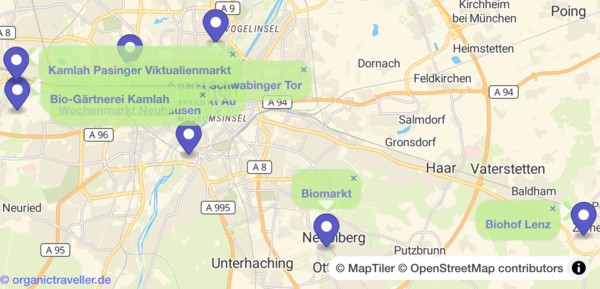
Closed
- Der plastikfreie Laden, Schlossstr. 7 (Munich's first zero-waste shop, also known as "Plastikfreie Zone", now online only)
- Mutternaturladen, Grünwalder Str. 244
- Mutternaturladen, Tumblinger Str. 45 (inside the Bahnwärter Thiel area
- Ohne, Schellingstr. 42
- Ohne Haidhausen, Rosenheimer Str. 85
- Naturverpacktes Westend Pur, Heimeranstr. 51a
- Evis – ab ins Glas, Pollinger Str. 11, Gilching
- Lela Lose, Freisinger Str. 3, Erding
2024-03-24 12:30:00
[Munich, Neubiberg, Erding, Gilching, Poing, Trudering, Unterfoehring, Wolfratshausen, Zorneding, Au, Haidhausen, Harlaching, Laim, Maxvorstadt, Pasing, Westend, organic, vegetarian, zero_waste, unverpackt, cafe, grocery, market, supermarkets, lunch, bakeries, butcher, tea, bodycare, household, sushi, wine]
Link

Wednesday, 21 February 2024
Dresden's Wilhelminian neighbourhood of Neustadt is dominated by independent shops and venues, many of them run by female entrepreneurs as documented by an art project of local photographer Christine Starke. So it comes as little surprise that it is here where you have the best chance to discover a lot of gems, driven in accordance with the personal principles of the shop keeper which often include social and environmental aspects. Keep your eyes open, and you will discover a lot more than I have to suggest here.
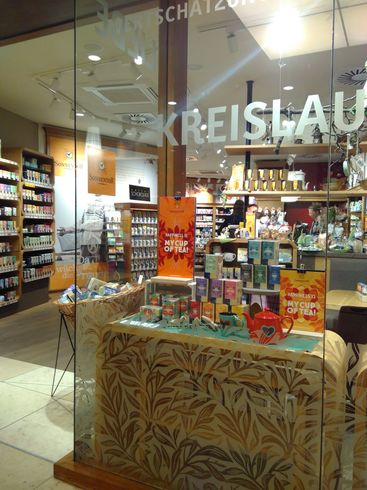
Herbalists and beauty
The old town does not have much to offer in terms of independent and surprising shops, and the Altmarkt-Galerie mall is as boring as these shopping centres usually are. A notable exception is the Sonnentor shop directly located at the mall's entrance at Postplatz, next to the tram-stop at Wallstraße. Franchises of this Austrian producer of organic and fairly traded herbs, teas, condiments, bodycare products and spices are usually located in malls or main shopping areas, neatly designed heavens offering products that are good for both, you, and the farmers and producers involved when you're in the mood for shopping.
If you're on the outlook for herbs, remedies, bodycare and food items based on ingredients described by medieval healer nun Hildegard of Bingen pay a visit to the Marone herbalist shop on Bautzner Landstraße directly located at the east-bound tram stop Pulsnitzer Straße. Not all of the products on sale (which among others include chestnut products and a small selection of biodynamic wine) in this small specialist shop are certified organic though.
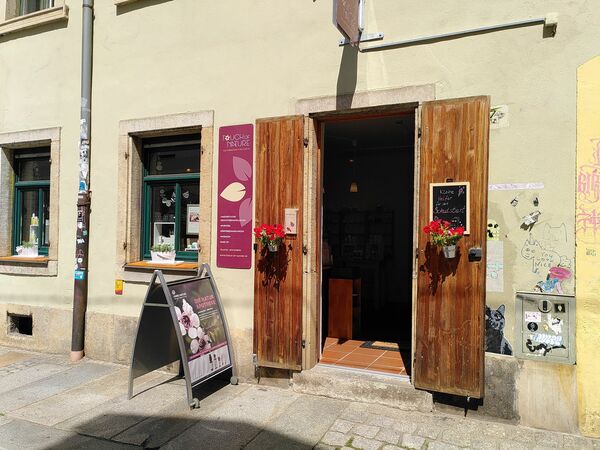
Leaving the tram tracks and entering the more pedestrian-friendly quartier natural and organic bodycare products can be found at the
Touch of Nature beauty parlour cum shop in Böhmische Straße east of Rothenburger Straße. Note that this shop is
closed on weekends.
Bicycles
A few steps from Touch of Nature there's a second hand bicycle shop cum workshop, Zwout! (formerly Elbcycles), where you can buy a used or recycled bike if you're staying longer, or get your own one fixed.
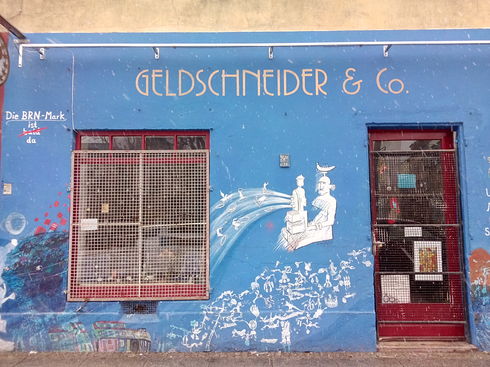
Jewellery
If you follow Böhmische Straße until it ends at Alaunstraße. A
luminous blue wall indicates the location of the Geldschneider & Co. steam-punk workshop. Among others you will find beautiful jewellery made from recycled parts of abandoned analog wrist watches. The place has somewhat erratic opening hours, so step by when nearby (if you need to plan ahead: Saturdays seem a safe bet). If closed during regular German shop opening hours you may call the phone number given on the entrance door.
Fair trade
As in many other German cities the first address for colourful gifts as well as organic sweets, spices and condiments are fair-trade shops founded as grassroots activities by Christian parish members in accordance with the conciliar process of mutual commitment (covenant) to justice, peace and the integrity of creation (JPIC). As the host for pioneering regional ecumenical plenums in 1989 and 1990 the city of Dresden has been playing an important role in this process. The spirit of this movement lives on in local fair trade initiatives like Quilombo which for almost 25 years had run a fair-trade shop in the entrance area of Dreikönigskirche in Hauptstraße which played host to the first democratically elected local parliament in Saxony after East Germany's peaceful implosion in 1989. Today the initiative still has a shop in the neighbourhood of Löbtau while their former place in the "Haus der Kirche" ("house of the church") has been converted into fair-trade
Cafe Dreikönig.
Sharing their roots with the Quilombo NGO the team of
Cafe Aha opposite Kreuzkirche runs a fair-trade shop in the heart of the city. It is located in the basement of the cafe and offers an impressive selection of fairly-traded gifts, body care and dry goods. This initiative also runs a fair-trade ...
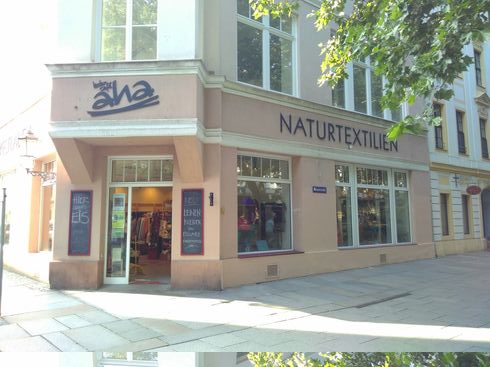
Fashion
... boutique, Aha Naturtextilien, on Hauptstraße, offering a great selection of fairly traded fashion made from natural materials. Here you will also find a good selection of stationary, jewellery, eatable fair-trade goods and more. By the way: the name "Aha" is an abbreviation for "trade/act differently" ("anders handeln" in German), and implies a huge effort in not only selling fairly traded goods but offering fair conditions to their own employees.
Another centrally located fair-trade shop specializing in fashion and household accessories as well as coffee and chocolates is Contigo near the central train station.
For more ethically produced and sustainable cocooning items visit Tranquillo, a likewise colourful fashion-and-things boutique cum fashion label in the Neustadt neighbourhood, at the crossroad Louisenstraße/Rothenburger Straße. They produce their own women fashion entirely made from organic textiles focussing on basic colours – if you like Aha Naturtextilien don't miss this one. There's also a sustainable furniture outlet cum cafe on the other side of the train tracks to Neustadt trainstation.
Dresden's first fashion boutique exclusively selling fairly produced clothing from fairly traded, organically grown materials is dubbed
Populi and
can be found at the Western end of Louisenstraße, just before you reach the tram tracks of Königsbrücker Landstraße.
Both, streetware, denim and designer labels can be found here, for men and women. The interior of the shop is to a great deal made from upcycled furniture.
Students and nerds find fairly traded organic cotton t-shirts and sweaters with unique scientific prints at Unipolar, and everyone else organic streetware for both, men and women. This small, Dresden-based fashion label is the brain-child of a former physics student. The original store between the Bahnhof Mitte train station and the "Carl Maria von Weber" College of Music does no longer exist. (But if you already are here: the VG warehouse next to this old location has a well-assorted organic fashion section upstairs.)
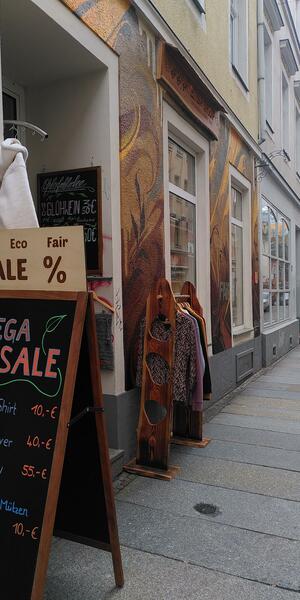
As of 2024 Unipolar consists of two shops on both sides of Rothenburger Straße in the Neustadt neighbourhood, one selling clothing, and the other shoes and sustainable household gear. Finding the shops is easy: Simply spot the bath tub opposite the tram stop.
More colourful organic streetware, less nerdy prints, and open late on Fridays and Saturdays – that's
El Dorado Street Fair in Alaunstraße.
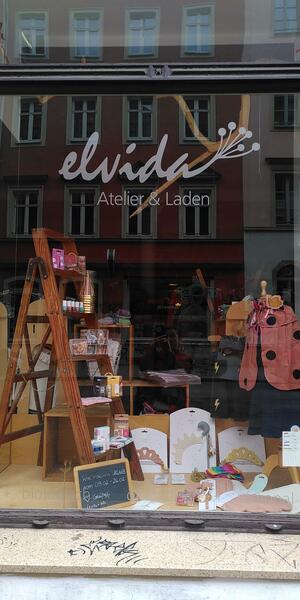
Before the arrival of noisy and cheap looking street food shops this street, the entrance to the Neustadt neighbourhood, was populated by numerous owner-run, carefully curated fashion boutiques and second-hand shops catering for a diverse crowd. Some of them have been surviving, and I'm more than happy that this shop venue, after the closing of El Dorado's predecessor, Invito, remained an organic fashion boutique.
Babies and toddlers
If you are on the look-out for beautiful, not overly sweet organic fashion for toddlers and smaller children or simply for beautiful organic garments step by Elvida in Louisenstraße approximately opposite Planwirtschaft pub and cafe. There you'll find the small flagship store of a Dresden-based sustainable kids fashion label – and a source for organic sewing things.
The following places shut down, so don't be mislead when you find references to them on the web:
- Quilombo, Haus der Kirche, Hauptstr. 23 (fair-trade)
- Baum&Wolle, Alaunstr. 13c (fashion)
- Ex Animo, Martin-Luther-Str. 17 (fashion and things)
- Hüpenthal Boutique, Bautzner Str. 63 (bespoke tailor, I miss your beautiful collars, r.i.p., Herr Hüpenthal!)
- Invito, Alaunstr. 20 (fashion, suceeded by El Dorado Street Fair)
- Lipfeins Lieblinge, Rothenburger Str. 1 (organic lipcare, factory outlet – their products can of course be obtained online or (e.g.) from one of the VG supermarkets)
- LouisdoOr, Louisenstr. 4 (sustainable toys and baby clothing)
- Tranquillo Outlet,
Louisenstr. 45 (organic fashion, visit them here)
- Unipolar Mitte, Jahnstr. 1
(streetware, visit them here)
- Un-Kraut, Martin-Luther-Pl. 12 (herbs and spices)
2024-02-21 15:30:00
[Dresden, Neustadt, shopping, organic, fair, fashion, shoes, spices, tea, herbs, delicatessen, gifts, upcycling, steampunk, bodycare, furniture, household, children, toys]
Link

If you are looking for pioneers in the German zero waste movement you'll find one of them in Dresden's Neustadt neighbourhood:
Bring a selection of glasses, containers and bags and stop by Lose ("loose-weight"), a cosy zero-waste corner store in Böhmische Straße. Unlike other package-free supermarkets this one does not only sell dry food, natural body care and household chemicals but also offers veges and has a cheese counter. Although most of the products are organic some are not, so you might want to check the labels on the suspenders for the bio keyword or ask.
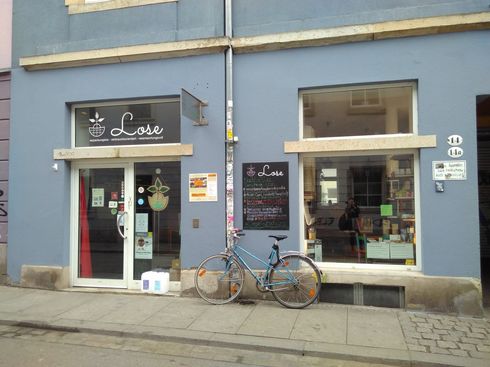
The interior of the shop was refurbished and is now much lighter and seems spacier than before. The reason for this is that the coffee corner which had been there before the corona pandemic has decreased and the serviced counter for bakery products, cheeses, antipasti and coffee moved from the entrance area to the backpart of the shop. Mind you: like other package-free shops Lose does not have an illuminated window front, so be brave to try the door handle – the place may look quite dark even when open.
Supermarkets with zero-waste stations
Moreover all shops of the co-operatively organised local wholesale chain VG Biomarkt offer a good selection of loose-weight organic dry goods (in addition to an abundance of often locally produced fruit and veges and dairy products and drinks of all kinds in returnable glass bottles).
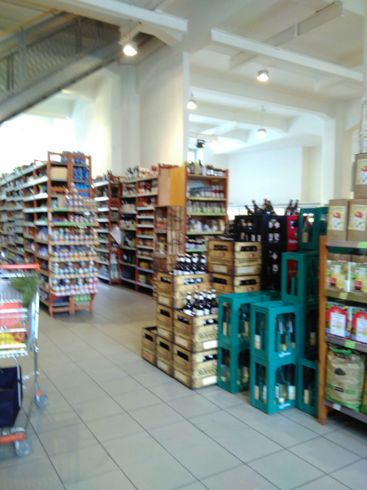
Their main shop is located near
Bahnhof Mitte train station, an entire organic warehouse on the premises of a former newspaper printing plant. Standing back from the main street the first floor is occupied by an organic convenience store supporting your zero-waste efforts. On the second floor there's a well assorted organic fashion store mainly for babies, children and women, with a section offering organic body care, household chemicals, sustainably produced toys, stationary and more.
For members prices are lower, but the shop is open to everyone.
On weekdays the self-service bistro directly facing the street offers delicious lunch (only snacks on Saturdays), and there's a cafe cum bakery shop featuring young local artists.
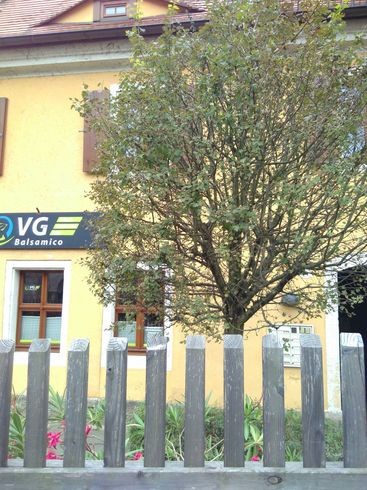
VG Biomarkt also has branches in the neighbourhoods of Neustadt (Hechtviertel), Striesen, Johannstadt, Strehlen, and Loschwitz,
Mind you that the one in Striesen, at Polandplatz isn't easy to find: Opposite the triangular park there's a driveway which one can easily miss as no sign at the entrance points to the shop. Be brave an move past, you'll find the shoü at the right hand site.
If you want to return empties, find the appropriate crate in the entrance area, pin down its code, tell the cashier and put the glass or bottle at the appropriate place.
The Loschwitz branch dubbed VG Balsamico is conveniently located
opposite the downhill station of the cable-run suspension railway ("Schwebebahn") next to
Körnerplatz at the northern end of Blaues Wunder ("blue wonder") bridge.
Opening hours and assortment (of loose-weight products as of products in returnable glasses) vary depending on the size of the market and the neighbourhood. However, all VG markets offer free drinking water refill stations and you can book cargo bikes to transport your purchase home free of charge.
While many organic groceries were closing, the Verbrauchergemeinschaft opened a new large supermarket with attached self-service restaurant cum cafe in 2023: The
VG Friedensstraße offers and abundance of loose weight and unpackaged products. Want to shop products grown or made in the vicinity? Watch out for the green "RP" ("regional partner") logo.
While these local groceries were early adopters a number of nation-wide operating organic supermarket chains have been following. In Dresden the two remaining branches of the Berlin-based supermarket chain Bio Company introduced dry food suspenders for use with your own jars.
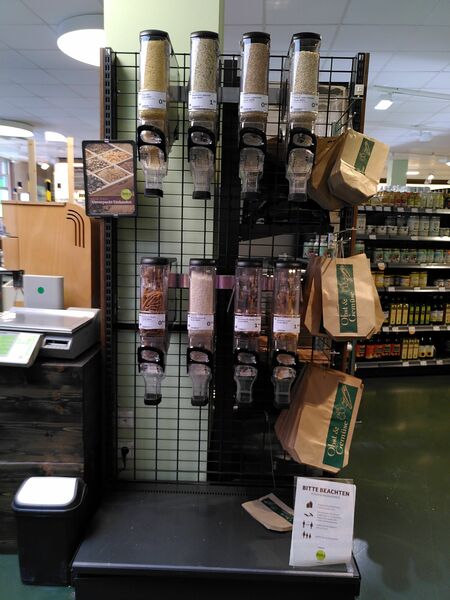
In 2021 the Denns Biomarkt was the first branch of this chain where I found a dedicated shelf with fairly traded dry food in retour glasses and a few gravity bins with nuts, seeds, rice and noodles. A start at least, although I have my doubts that this small selection will be sufficient to nudge people towards the extra effort it takes to bring along glasses and jars.
Without offering gravity bins the Vorwerk Podemus farm supermarkets supports package-free efforts, too: Hand over your own clean boxes and bags when buying meat and meat products, cheese, bread, rolls or cake from the services counter, and prefer returnable glass bottles and glasses when choosing jogurt, honey and jams.
Farmshops and factory outlets
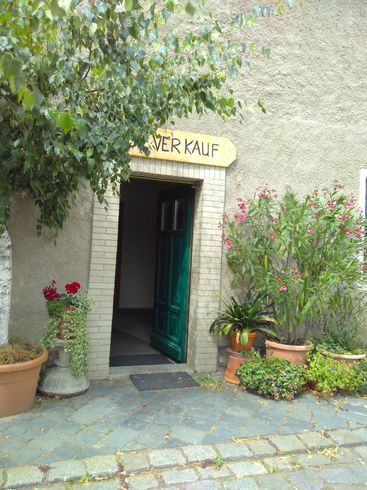
When you take the Elberadweg bicycle route on the southern shore in direction Niederwartha you'll pass a nice old farmyard, the organic Bauernhof Franz in Niedergohlis. It runs a subscription scheme – phone in or e-mail your order until Wednesday and collect it from the farmshop on Fridays and Saturdays, but if you happen to step by on one of these days and there's someone around you may be able to buy vegetable oil and perhaps also potatoes or other produce from the farm. But of course, shopping their farm products from one of the VG supermarkets might be easier.
In 2022 Vegannett, a Weißer Hirsch-based producer of vegan spreads, started filling products in standardized returnable deposit glasses which
you can buy directly from the manufacturer on Wednesdays.
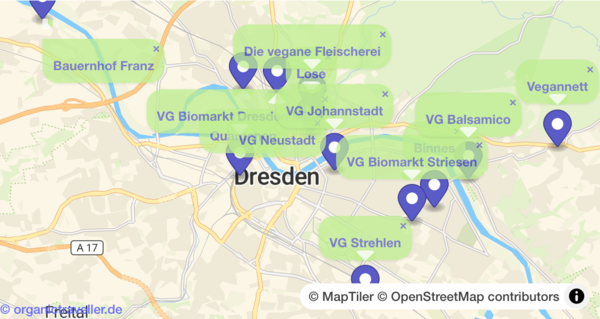
More to try
For more vegan alternatives to cheese, meat and sausages head for
Die vegane Fleischerei in the Neustadt. January, 2023 a vegan "butcher shop" opened here, and they assured me that all of their products are made from predominantly organic ingredients.
They also offer ready-made "meat" salads and soups, and I'm looking forward to visit the shop in person. Don't forget to take boxes and jars with you.
Closed
2024-02-21 04:00:00
[Dresden, Neustadt, organic, coffee, vegan, zero_waste, unverpackt, cafe, grocery, market, supermarkets, bodycare, household, hemp]
Link

Saturday, 25 November 2023
For (re-)filling your kitchen cupboard and shop for un(pre)packaged food head straight to the northern shore of the Neckar river, to the Neuenheimer Markt market place. On Wednesday mornings (until 1 pm) a farmer's market is held here, but a few steps
away
you will also find the city's only package-free supermarket dubbed Annas Unverpacktes ("Anna's unwrapped goods") which with its outer wall made of turquoise tiles looks like a converted butcher's shop from the outside. As all zero waste convenience stores I've come across so far it's strictly vegetarian, but omnivores simply walk outside and turn left to find an artisanal butcher's shop at the next corner.
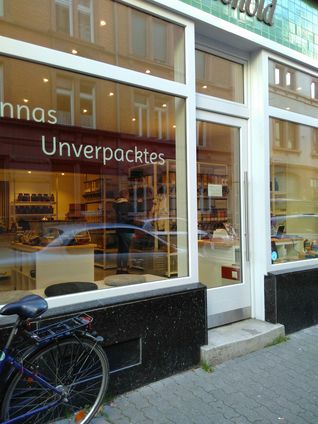
Until some years ago the Metzgerei Blatt was working according to the Neuland principles of animal welfare in meat production which are close to, but not fully organic, and in 2015 turned to fully organic principles. The shop was closed when I went there (as it's generally closed on Wednesday afternoons), but the owner assured me that the staff would fill my purchase into my own clean boxes as long as they were intended for personal consumation (instead of catering a bigger crowd). Ready-to-eat meat dishes are also available to take away.
Directly opposite the Neuenburger Markt there's also a shop of the local wholefood bakery Mahlzahn named after the dragon in Michael Ende's famous children's novel "Jim Button and Luke the Engine Driver". Here the shop assistants will happily put your bread, rolls, sweet and savoury pastries into the bags or containers you present.
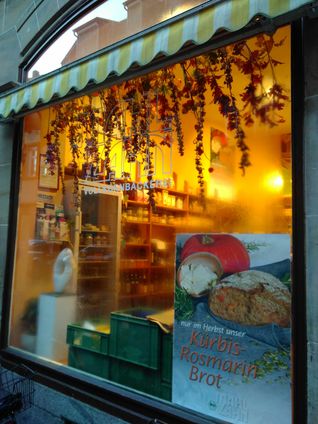
The bakery workshop itself is located in the Weststadt neighbourhood where you also can buy a small selection of loose-weight seasonal fruit and veges and assorted pre-packaged organic food items to supplement your breakfast, lunch or coffee table. When I went there in hope for an early organic breakfast it however turned out that this bakery doesn't follow the zeitgeist to serve coffee and snacks to eat on the spot everywhere -- no coffee machine here, no bar tables. (The rolls were delicious nevertheless.)
Mind you that this bakery does not use white flour at all.
Altogether there are four Mahlzahn shops, all with identical opening hours, the third one located in the neighbourhood of Rohrbach, and the fourth in Handschuhsheim (literally: "glove's home").
In general you will have difficulties to find organic bakeries not willing to fill customer-provided clean bags and boxes, and the new (in 2023) Zeit für Brot shop thankfully make no exception.
To buy all items for a zero waste breakfast at one stop head for the city's branch of the Denn's organic supermarket chain: The staff at its meat, dairy and bakery counters offers to fill cheese, cured meat products, sausages and bakery items into your containers. If you buy a coffee drink on the go in your own cup you'll receive a 30 cents discount, and you can also buy lunch to take away in your own jars instead of having it at the self-service bistro.
The other nationwide operating organic supermarket brand, Alnatura, operates three branches in town. They do not have a dedicated focus on zero waste, but there's a slowly increasing assortment of food in returnable glasses (e.g. mayonnaise, "canned" corn and other preserves, or vegetable spread) apart from unpackaged fruits, vegetables, and bakery produce. Unfortunately you must be familiar with the glass types to find them, and they are always among the most expensive options.
If you prefer independent shops the two Fair & Quer supermarkets in the neighbourhoods of Handschuhsheim and Wieblingen are worth a try.
Unfortunately I did not have the chance to visit them (as advised by my Mastodonbubble), so I cannot say whether their waste and package reduction measures exceed those of comparable dedicated organic supermarkets in Germany.
The shop in Wieblingen offers organic lunch Monday through Friday from noon to 2pm.
Student initiatives
I wasn't much surprised to hear from my Mastodon bubble about zero-waste and repair initiatives run by the university's students' parliament. Unfortunately I have not had the time to visit the campus, but I happily list them here: The self-service bike repair shop Urrmel and the package-free organic food co-operative Appel un' Ei. The latter is located between "Chez Pierre" and "Café Botanik" at the university's main refectory and is regularly offering lunch made with produce from a communal market garden.
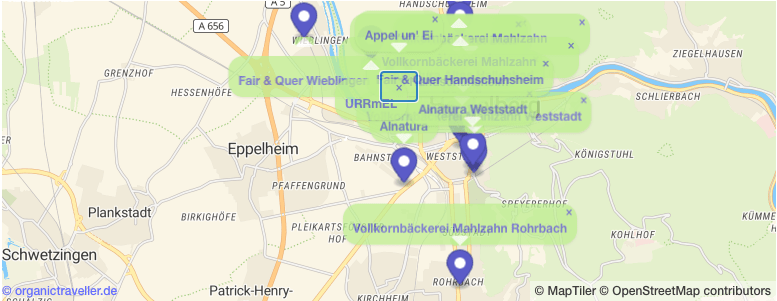
More to try
Here are a few more shops which I found during my research but didn't manage to visit myself:
Closed
You may still find references to the following organic grocery on the web, but be assured it's no longer there:
2023-11-25 22:30:00
[Heidelberg, organic, vegetarian, zero_waste, unverpackt, cafe, grocery, supermarkets, butcher, lunch, snacks, coffee, bodycare, household]
Link


































